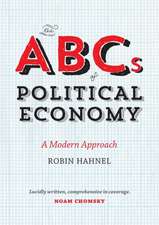Thinking About Social Policy: The German Tradition: German Social Policy, cartea 1
Autor Franz-Xaver Kaufmannen Limba Engleză Hardback – 15 noi 2012
| Toate formatele și edițiile | Preț | Express |
|---|---|---|
| Paperback (1) | 381.21 lei 6-8 săpt. | |
| Springer Berlin, Heidelberg – 14 dec 2014 | 381.21 lei 6-8 săpt. | |
| Hardback (1) | 388.52 lei 6-8 săpt. | |
| Springer Berlin, Heidelberg – 15 noi 2012 | 388.52 lei 6-8 săpt. |
Preț: 388.52 lei
Nou
Puncte Express: 583
Preț estimativ în valută:
74.35€ • 76.82$ • 61.85£
74.35€ • 76.82$ • 61.85£
Carte tipărită la comandă
Livrare economică 19 martie-02 aprilie
Preluare comenzi: 021 569.72.76
Specificații
ISBN-13: 9783642195006
ISBN-10: 3642195008
Pagini: 180
Ilustrații: X, 166 p.
Dimensiuni: 155 x 235 x 17 mm
Greutate: 0.43 kg
Ediția:2013
Editura: Springer Berlin, Heidelberg
Colecția Springer
Seria German Social Policy
Locul publicării:Berlin, Heidelberg, Germany
ISBN-10: 3642195008
Pagini: 180
Ilustrații: X, 166 p.
Dimensiuni: 155 x 235 x 17 mm
Greutate: 0.43 kg
Ediția:2013
Editura: Springer Berlin, Heidelberg
Colecția Springer
Seria German Social Policy
Locul publicării:Berlin, Heidelberg, Germany
Public țintă
ResearchCuprins
L. Leisering: Introduction.- F.-X. Kaufmann: Thinking About Social Policy: Introduction; Social Policy as Mediation Between "State" and "Civil Society"; The Workers' Question and Social Policy (1863-1918); The Crisis of Social Policy (1920-1945); Social Policy Since the Second World War; Concluding Remarks.
Notă biografică
Franz-Xaver Kaufmann is Professor emeritus for Social Policy and Sociology at the University of Bielefeld, Germany. He studied law, economics and sociology in Zurich, St. Gall and Paris. He is the doyen of the sociology of social policy in Germany and has been awarded honorary doctorates and prizes, including the Preller Prize for Social Policy and the Schader Prize for Applied Social Science.
Lutz Leisering, the Editor, is Professor for Social Policy and Director at the Institute for World Society studies, University of Bielefeld. He took his Ph.D. at the London School of Economics. He has published widely on European and global social policy.
Lutz Leisering, the Editor, is Professor for Social Policy and Director at the Institute for World Society studies, University of Bielefeld. He took his Ph.D. at the London School of Economics. He has published widely on European and global social policy.
Textul de pe ultima copertă
The book is part of the 5-volume series “German Social Policy”, a unique multidisciplinary approach to the history of German social policy written by the doyens of their respective disciplines. The volumes expound the contribution of the German tradition to the rise of social policy in the Western world in the 19th and 20th centuries. Germany pioneered modern social policy in the 19th century when Bismarck introduced social insurance. After the Second World War, Germany’s Social Market Economy became a model of social integration. The volumes cover the history of ideas (volume 1), the legal and political history before and after 1945 (volumes 2 and 3), the German Democratic Republic (1949-1990) and the impact of German reunification (1990) (volume 4). Volume 5 embeds the German case in a major comparative study of European welfare states, complemented by a study of the USA and the Soviet Union. The volumes also yield insights into general theoretical issues of social policy beyond the empirical case of Germany. Each volume has an introduction by the editor who summarizes the contribution made by the volumes and looks into the future of German social policy.
The book traces the political history of the concept of social policy. „Social policy“ originated in Germany in the mid 19th century as a scholarly term that made a career in politics. The term became more prominent only after World War II. Kaufmann, the doyen of the sociology of social policy in Germany, argues that „social policy“ responds to the modern disjunction between “state” and “society” diagnosed by the German philosopher Hegel. Hegel’s disciple Lorenz von Stein saw social policy as a means to pacify the capitalist class conflict. After World War II, social policy expanded in an unprecedented way, changing its character in the process. Social policy turned from class politics into a policy for the wholepopulation, with new concepts – like "social security", "redistribution" and "quality of life" - and new overarching formulas, "social market economy" and "social state" (the German version of “welfare state”). Both formulas have remained indeterminate and contested, indicating the inherent openness of the idea of the “social”.
The book traces the political history of the concept of social policy. „Social policy“ originated in Germany in the mid 19th century as a scholarly term that made a career in politics. The term became more prominent only after World War II. Kaufmann, the doyen of the sociology of social policy in Germany, argues that „social policy“ responds to the modern disjunction between “state” and “society” diagnosed by the German philosopher Hegel. Hegel’s disciple Lorenz von Stein saw social policy as a means to pacify the capitalist class conflict. After World War II, social policy expanded in an unprecedented way, changing its character in the process. Social policy turned from class politics into a policy for the wholepopulation, with new concepts – like "social security", "redistribution" and "quality of life" - and new overarching formulas, "social market economy" and "social state" (the German version of “welfare state”). Both formulas have remained indeterminate and contested, indicating the inherent openness of the idea of the “social”.
Caracteristici
This is the authoritative study on the development of the concept of social policy from 1840-2000 Relates changes in conceptual thinking to changes in politics A major contribution to the history of social science Includes supplementary material: sn.pub/extras





















